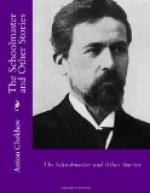And the next day when Vremensky came to his office it was a long time before the director could bring himself to tell the truth. He hesitated, was incoherent, and could not think how to begin or what to say. He wanted to apologize to the schoolmaster, to tell him the whole truth, but his tongue halted like a drunkard’s, his ears burned, and he was suddenly overwhelmed with vexation and resentment that he should have to play such an absurd part—in his own office, before his subordinate. He suddenly brought his fist down on the table, leaped up, and shouted angrily:
“I have no post for you! I have not, and that’s all about it! Leave me in peace! Don’t worry me! Be so good as to leave me alone!”
And he walked out of the office.
A PECULIAR MAN
BETWEEN twelve and one at night a tall gentleman, wearing a top-hat and a coat with a hood, stops before the door of Marya Petrovna Koshkin, a midwife and an old maid. Neither face nor hand can be distinguished in the autumn darkness, but in the very manner of his coughing and the ringing of the bell a certain solidity, positiveness, and even impressiveness can be discerned. After the third ring the door opens and Marya Petrovna herself appears. She has a man’s overcoat flung on over her white petticoat. The little lamp with the green shade which she holds in her hand throws a greenish light over her sleepy, freckled face, her scraggy neck, and the lank, reddish hair that strays from under her cap.
“Can I see the midwife?” asks the gentleman.
“I am the midwife. What do you want?”
The gentleman walks into the entry and Marya Petrovna sees facing her a tall, well-made man, no longer young, but with a handsome, severe face and bushy whiskers.
“I am a collegiate assessor, my name is Kiryakov,” he says. “I came to fetch you to my wife. Only please make haste.”
“Very good . . .” the midwife assents. “I’ll dress at once, and I must trouble you to wait for me in the parlour.”
Kiryakov takes off his overcoat and goes into the parlour. The greenish light of the lamp lies sparsely on the cheap furniture in patched white covers, on the pitiful flowers and the posts on which ivy is trained. . . . There is a smell of geranium and carbolic. The little clock on the wall ticks timidly, as though abashed at the presence of a strange man.
“I am ready,” says Marya Petrovna, coming into the room five minutes later, dressed, washed, and ready for action. “Let us go.”
“Yes, you must make haste,” says Kiryakov. “And, by the way, it is not out of place to enquire—what do you ask for your services?”
“I really don’t know . . .” says Marya Petrovna with an embarrassed smile. “As much as you will give.”
“No, I don’t like that,” says Kiryakov, looking coldly and steadily at the midwife. “An arrangement beforehand is best. I don’t want to take advantage of you and you don’t want to take advantage of me. To avoid misunderstandings it is more sensible for us to make an arrangement beforehand.”




